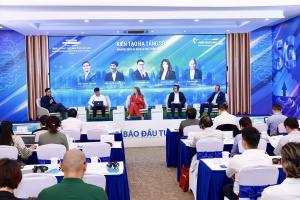Opportunities for businesses in 5G
The Ministry of Information and Communications has, as of 2024, granted licences for frequencies to deploy 5G networks to major operators like Viettel and VNPT, with the goal of achieving nationwide coverage by 2030. Viettel, the first network to successfully test commercial 5G technology in 2019, has now expanded testing to 61 provinces and cities nationwide.
 |
| Ngo Thanh Hai and Nguyen Van Anh, lawyers at LNT & Partners |
VNPT and MobiFone are also vigorously advancing their 5G network development plans, installing a series of new broadcasting stations in preparation for the commercialisation phase.
Companies have prospects to expand and optimise their processes. This involves integrating this advanced technology into everyday life and business on a broad scale. This process includes developing 5G network infrastructure, licensing frequencies, and rolling out 5G services to both consumers and businesses. The aim of commercialisation is to harness the technology’s potential to drive digital transformation, enhance production efficiency, and generate economic value across various industries.
Learning from the experiences of other countries, 5G has supported smart manufacturing and supply chain optimisation in Germany and Japan. In the United States and South Korea, 5G is utilised for the development of autonomous vehicles and smart transportation systems, while in the UK and China, this technology is applied to telemedicine. E-commerce and entertainment platforms in the US, China, and South Korea also leverage 5G to enhance user experiences. Additionally, the Netherlands and Australia use 5G in agriculture to increase yields and reduce costs.
In a digital environment
The application of 5G technology will bring opportunities to many businesses. However, sectors with the potential to accelerate the digitisation process, supported by Vietnam’s current legal framework, include banking, fintech companies, e-commerce businesses, and companies that bring goods and services to online platforms.
The current development trends of credit institutions include digital transformation and the emergence of digital banks. These are banks that operate entirely in a digital environment without physical branches, thanks to advanced technological platforms such as AI, big data, cloud computing, and blockchain. Digital banking is the result of collaboration between traditional banks and fintech, offering online services through super mobile apps.
In Vietnam, the trend of fintech development is currently evident through the rise of tech startups and non-bank organisations with strong financial technological capabilities.
The Law on Credit Institutions, effective from July, introduces new provisions to accommodate emerging activities aligned with the digital transformation trend. This includes the authorisation of a testing mechanism for fintech innovations in banking, online lending, and electronic transactions.
To facilitate the implementation of this testing mechanism, the State Bank of Vietnam is developing a draft on a controlled testing framework in the banking sector, focusing on fintech companies and solutions applied to banking operations. To prioritise online transactions, the government has also enacted Decree No.52/2024/ND-CP, which outlines regulations for non-cash payments. This decree includes additional provisions regarding cryptocurrencies, international payments, and e-wallets and prepaid cards applicable to credit institutions.
The use of 5G technology is pivotal in supporting digital transformation goals and advancing related banking, as highlighted by current development trends in credit institutions. With its superior data transmission speeds and low latency, 5G enables such banks to deliver online services more swiftly and efficiently, particularly in real-time transactions such as electronic payments and transfers.
Furthermore, 5G enhances connectivity and integration with advanced technology platforms like AI, big data, and blockchain, allowing digital banks to offer intelligent, personalised financial services and strengthen transaction security.
Meanwhile, in the relationship between traders owning e-commerce platforms and customers, traders are required to ensure the security of payment activities in accordance with Article 74 of Decree 52. This includes encrypting information and using security protocols to protect data from exposure during transmission, maintaining an information system that ensures continuous online connectivity 24/7, among other measures.
Assessing the risks
In the contractual relationship between buyers and sellers, electronic contracts with digital signatures are increasingly reinforced by Decree No.48/2024/ND-CP of this year and the development of smart contracts utilising blockchain technology. In this context, 5G technology’s rapid data transmission speeds and low latency enhance the efficiency of processing and verifying contracts, including those involving e-signatures and smart contracts on blockchain platforms.
Regarding interactions with payment intermediaries, Article 75 of Decree 52 stipulates that intermediaries must ensure data storage for each payment transaction and share joint responsibility with merchants for information management. Given the growing volume of online transactions, 5G technology enables payment intermediaries to store and access transaction data more efficiently, providing better security for customer information.
There is currently no legal framework regulating the application of fintech. To accelerate the adoption of digital banking and fintech within credit institutions and relevant companies, it is essential that the draft decree on controlled testing mechanisms in banking be implemented without delay.
Secondly, concerning the legal value of smart contracts utilising blockchain technology, there is currently no legal framework that formally recognises their legal standing. Although Article 385 of the Civil Code 2015 and Article 34 of Law on Electronic Transactions 2023 suggest that smart contracts possess the full legal nature of civil and electronic contracts, the law still lacks explicit recognition of their legal value.
Furthermore, concerning cybersecurity in transaction activities and customer data storage, this represents a significant risk associated with the adoption of new technologies. Currently, the Cybersecurity Law provides the legal foundation for mechanisms to protect information security on the internet. Decree No.13/2023/ND-CP from 2023 outlines rules and reporting requirements for personal data protection to cybersecurity agencies. However, there remains a lack of a regulatory framework for penalties related to personal data protection. Therefore, a penalty decree should be issued promptly to encourage businesses to enhance their awareness of information security while implementing advanced tech.
In the short term, prioritising investment in technological infrastructure, bolstering security measures, and optimising electronic transaction processes is essential. As legal mechanisms become fully established and enforced, businesses should engage closely with regulatory bodies to ensure the efficient and secure implementation of 5G in their operations.
 | Ericsson seeks to become ally ahead of Vietnam's 5G rollout With its expertise in providing global solutions for telecommunications and multimedia, Ericsson Vietnam is aiming to assist Vietnam in developing and applying 5G technology in the most effective way. |
 | VIR panel says 5G could transform Vietnam At the opening panel of VIR’s digital infrastructure conference on September 30, experts spoke of the transformative power of 5G technology in spurring innovation and economic growth, while highlighting the challenges surrounding infrastructure investment and regulatory reforms. |
 | 5G rollout strategy discussed during VIR panel Industry experts discussed the effective rollout of 5G services and its applications during the second panel of VIR's conference on the digital economy from September 30. |
 | Assessing 5G enablers for digital economy development in Vietnam Digital transformation is reshaping industries, and 5G will be an enabler for significant growth and transformation in the country’s digital economy. Khanh Nguyen, vice chairman of the Digital Sector Committee under the European Chamber of Commerce in Vietnam, discussed with VIR’s Bich Thuy how Vietnam can develop its digital economy. |
 | Driving digital transformation with 5G As a pioneer in 5G network infrastructure, Ericsson is supporting Vietnam in developing its digital economy. Rita Mokbel, head of Ericsson Vietnam, talked to VIR’s Bich Thuy about upcoming priorities to support building innovative 5G use cases. |
What the stars mean:
★ Poor ★ ★ Promising ★★★ Good ★★★★ Very good ★★★★★ Exceptional
Related Contents
Latest News
More News
- Citi economists project robust Vietnam economic growth in 2026 (February 14, 2026 | 18:00)
- Sustaining high growth must be balanced in stable manner (February 14, 2026 | 09:00)
- From 5G to 6G: how AI is shaping Vietnam’s path to digital leadership (February 13, 2026 | 10:59)
- Cooperation must align with Vietnam’s long-term ambitions (February 13, 2026 | 09:00)
- Need-to-know aspects ahead of AI law (February 13, 2026 | 08:00)
- Legalities to early operations for Vietnam’s IFC (February 11, 2026 | 12:17)
- Foreign-language trademarks gain traction in Vietnam (February 06, 2026 | 09:26)
- Offshore structuring and the Singapore holding route (February 02, 2026 | 10:39)
- Vietnam enters new development era: Russian scholar (January 25, 2026 | 10:08)
- 14th National Party Congress marks new era, expands Vietnam’s global role: Australian scholar (January 25, 2026 | 09:54)

 Tag:
Tag:



















 Mobile Version
Mobile Version